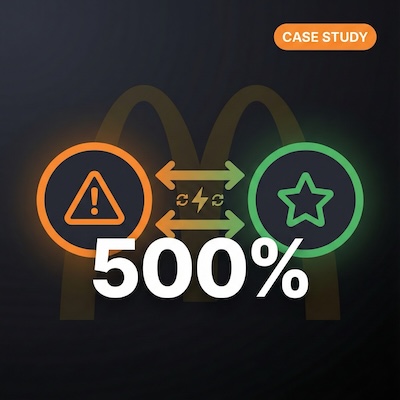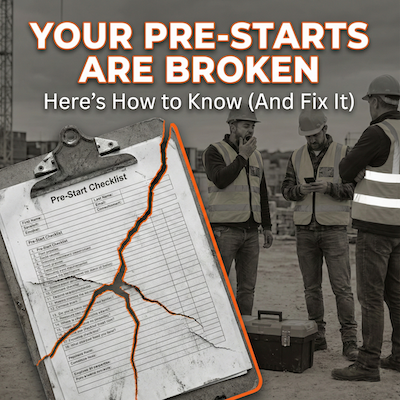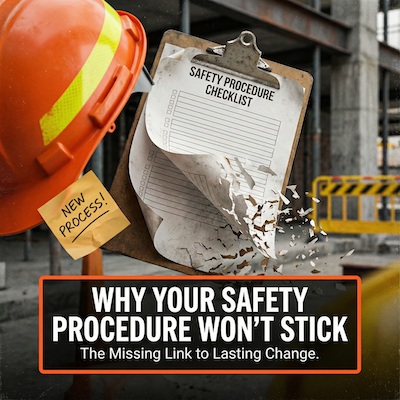Introduction: Rethinking the Traditional Approach to Safety
The mantra of "Safety First" has long resonated within the construction industry. It’s been the cornerstone of safety management, a non-negotiable priority that precedes all else. But as the industry evolves, so must our approach to safety. For senior safety managers, the time has come to explore new paradigms that integrate safety within the very fabric of the task rather than isolating it. This post delves into the inherent problems of the "Safety First" paradigm and offers a fresh perspective on managing safety in today's rapidly changing construction landscape.
The Problems with "Safety First"
Separation of Safety from Task: More Harm than Good?
Isolating Safety: A Reductionist Approach
"Safety First" may seem like a positive approach on the surface, but its separation from the actual task can lead to reductionism. By treating safety as an isolated entity, we inadvertently create barriers that may work against the very safety we aim to promote. It’s as if we place safety in a glass cage, visible but untouchable in daily tasks.
The Counterproductive Impact
This disconnect between safety and the task leads to a lack of understanding of how safety principles apply in real-life situations. Contractors and workers may find themselves following rules without truly integrating them into their workflow. The result? A safety culture that is more about compliance than true engagement.

Creation of a Culture of Fear: A Hidden Obstacle
The Fear Factor in Construction Sites
Constant emphasis on "Safety First" can unintentionally create a culture of fear on construction sites. By repeatedly underlining the potential hazards and risks, workers may become reluctant to take calculated risks, even when it is safe to do so.
Risks and Opportunities: Finding the Balance
The fear of making a mistake or breaching a safety protocol can lead to over-caution. This cautious approach stifles the ability to adapt and innovate, hindering progress and efficiency. Is it possible that our unwavering focus on safety is causing us to miss opportunities for growth and development in the construction industry?
Discouraging Innovation: A Barrier to Progress
The Risk-Averse Mindset
The "Safety First" principle can inadvertently discourage innovation in construction. When contractors are steeped in fear and uncertainty, they may shy away from trying new materials or methods. This risk-averse mindset leads to a stagnant industry, where old methods are clung to, and fresh ideas are stifled.
Stifling Creativity: A Costly Affair
Such reluctance to embrace innovation can lead to less efficient and cost-effective construction projects. By remaining tethered to established methods, we may be missing out on technological advancements and modern techniques that could revolutionize the way we build.

New Paradigms in Construction Safety
Establishing a Safety Culture: A Harmonious Blend
Compliance Meets Abundance Thinking
In stepping beyond "Safety First," a promising avenue emerges: the fusion of compliance with abundance thinking. Compliance ensures rules are followed, but it’s the addition of abundance thinking, which emphasizes positive reinforcement, that breathes life into safety culture.
Scratchie: A Catalyst for Change
Scratchie, the app designed to enhance construction safety through on-the-spot rewards, is a tangible embodiment of this new paradigm. It integrates safety seamlessly into daily tasks, nurturing a culture where safety is lived, not just enforced. Supervisors can provide immediate, categorized rewards, creating a positive approach that fosters engagement and motivation.
Viewing Construction Safety Holistically: A Healthier Perspective
Safety as Personal Wellbeing
If we think of construction safety like the health of a person, we begin to see it more holistically and positively. It's not about fear of illness but a desire for wellness. This paradigm shift views safety not as a set of constraints but a pathway to thriving construction sites.
The Human Element: People Over Protocols
Embracing this perspective means focusing on the people involved in construction. It's about creating environments where workers feel supported and understood, where safety protocols align with human needs and intuition.
Scratchie's Success and Acceptance: A Community Embracing Change

Love at First Site
Workers and supervisors don't just like the new paradigm; they love it. Scratchie's success stories are abundant, with videos showing construction sites engaging happily, often accompanied by the question, "where has this been?!"
Engagement Beyond Compliance
Scratchie goes beyond mere compliance; it sparks joy and enthusiasm. By gamifying safety and integrating it seamlessly into everyday tasks, Scratchie turns what could be a dreary obligation into an engaging journey.

Conclusion: Embracing a Future Beyond "Safety First"
A Fresh Approach to Safety
The traditional "Safety First" approach, while well-intentioned, has shown its limitations. Its separation from daily tasks, tendency to create fear, and potential stifling of innovation are significant concerns. The construction industry is ready for a new paradigm that sees safety not as a separate entity but as an integral part of every task, a part of the very culture of the worksite.
The Power of Positive Reinforcement
Positive reinforcement, as championed by platforms like Scratchie, offers a groundbreaking alternative. By allowing supervisors to provide instant rewards for safe behaviors, safety becomes an engaging, motivating factor rather than a looming threat. It’s a shift from a culture of fear to a culture of empowerment.
A Holistic View of Safety
By viewing construction safety more like personal health, we can foster an environment that cares for workers’ wellbeing rather than merely avoiding hazards. This human-centric approach resonates with both workers and supervisors, promoting a more harmonious and productive workplace.
The Success of Scratchie: A Testament to Change
Scratchie's widespread acceptance and success within major Australian builders are clear indicators that the industry is hungry for change. The joy and engagement it brings to construction sites are proof that a new paradigm in safety management is not only possible but embraced with open arms.
Be Part of the Change
As we stand on the cusp of a new era in construction safety, the role of senior safety managers is pivotal. It's an opportunity to move beyond the known and explore a future where safety is a vibrant, integral part of our daily work. The tools and strategies are available; the question is, are you ready to be part of this exciting transformation?
Join us in this journey towards a positive, engaging, and holistic approach to construction safety. Explore Scratchie, and discover how it can bring unique value to your construction site. Let's build together a future where safety is not an isolated priority but a thriving aspect of our work culture.
Frequently Asked Questions (FAQ)
Q: What are the main limitations of the traditional "Safety First" approach in construction?
A: The "Safety First" approach can lead to separation of safety from daily tasks, create a culture of fear on construction sites, and discourage innovation. These limitations may work against safety, stifle creativity, and impact overall efficiency.
Q: How does Scratchie offer an alternative to the "Safety First" paradigm?
A: Scratchie provides a blended approach of compliance with abundance thinking, fostering a positive safety culture. It emphasizes on-the-spot rewards for safe behaviors, integrating safety into daily tasks, and promotes a more positive, human-centric approach.
Q: Can the emphasis on safety actually hinder innovation in construction?
A: Yes, the constant emphasis on safety can lead to a fearful work environment where contractors and workers might be reluctant to try new materials or methods. This can stifle innovation and creativity, limiting the efficiency and effectiveness of construction projects.
Q: What does it mean to view construction safety holistically, like personal health?
A: Viewing construction safety holistically means considering it as an integral part of every task, much like personal health is an integral part of daily life. It emphasizes overall well-being, promotes positive engagement, and considers emotional, physical, and psychological factors.
Q: How have workers and supervisors responded to Scratchie's approach to safety?
A: Scratchie has received positive feedback from workers and supervisors, who have embraced the app’s positive reinforcement methods. Videos and testimonials from various construction sites show people engaging happily with Scratchie, often asking, "where has this been?!"










.svg)
